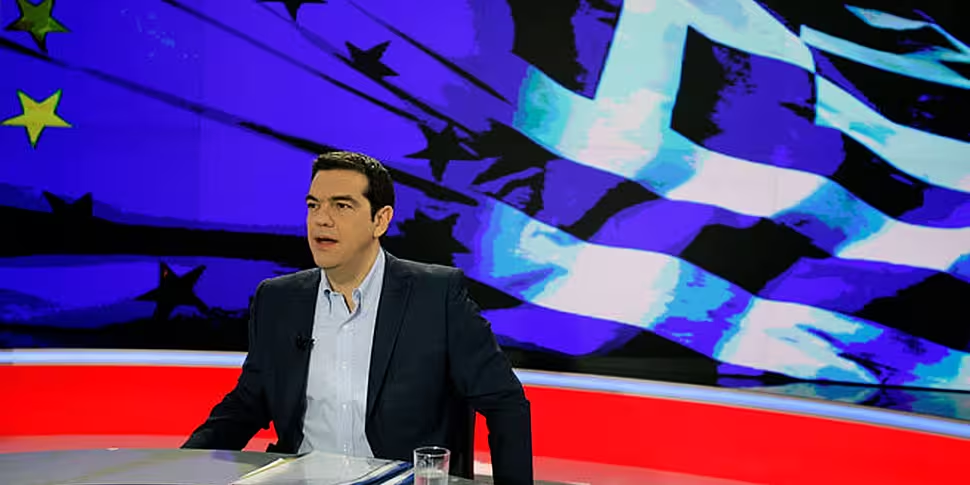A member of the Greek opposition is warning his country will be facing a 'dead end' if Sunday's referendum is rejected.
Greece looks set to default on a €1.55bn debt repayment due to the International Monetary Fund (IMF) today - plunging the country deeper into crisis and increasing the likelihood of a Eurozone exit.
Prime Minister Alexis Tsipras admitted his country was unlikely to meet the debt.
"How is it possible the creditors are waiting for the IMF payment while our banks are being suffocated?" he said in an interview on Greek TV.
Athens withdrew from negotiations over a new EU bailout package at the weekend after it was made clear it would have to impose austerity measures in exchange for cash.
Mr Tsipras instead arranged a referendum for Sunday - and is urging voters to say no to the bailout proposal.
However, a former government minister has said he would be only be offered a much worse deal because of damage done to the economy in recent days, and warned Greece will end up 'alone'.
Adonis Georgiadis is a Greek MP with opposition party New Democracy and a former health minister.
He told Newstalk Breakfast the only way to save Greece is to vote yes, and get Syriza out of power.
European leaders have warned this would lead to Greece leaving the monetary union.
Last night, the Taoiseach Enda Kenny wrote to Mr Tsipras saying the door remains open for fresh talks.
Mr Kenny said the Irish government would support an agreement that is mutually beneficial to the Greek and Irish people.
He was responding to a letter from Mr Tsipras to all EU leaders, asking for an extension of the bailout until after Sunday's referendum.
Mr Kenny said Ireland will continue to support what he calls a sustainable and mutually beneficial agreement.
The Taoiseach noted he had hoped for an agreement over the past week, but that was not possible because Greece broke off the negotiations.
He concludes saying he hopes negotiations can resume quickly, adding the door remains open to dialogue in a spirit of solidarity and responsibility, and acknowledge's Greece's stated commitment to its membership of the Eurozone.
Mr Kenny said the Greeks left it until the last minute to call the referendum.
Taoiseach @EndaKennyTD has tonight wtitten to Greek PM @atsipras #ntfm #GreeceCrisis #greece #Grexit pic.twitter.com/8jtlhDte1w
— Páraic Gallagher (@paraicgallagher) June 29, 2015
The Economic Management Council also met to discuss developments in Greece and across the Eurozone.
The Council received a briefing from the Governor of the Central Bank Patrick Honohan and Cathal Kelly of the NTMA.
The meeting took note of the calm in Irish financial markets and the government says it intends to keep developments in Greece under review.
'At the core, is a yes or no to the Eurozone'
Meanwhile, European leaders have begun efforts to convince Greece to vote yes in Sunday's referendum on bailout proposals.
French president Francois Hollande said: "What is at stake is whether or not Greeks want to stay in the eurozone or want to take the risk of leaving."
German Vice-Chancellor Sigmar Gabriel added: "It must be crystal clear what is at stake. At the core, it is a yes or no to remaining in the Eurozone."
Mr Tsipras asked for Greece's bailout programme, which expires today, be extended for a month to allow the referendum to be carried out "in a calm and positive climate".
However, Eurozone leaders immediately rejected the idea.
But despite their rhetoric, Mr Tsipras does not believe they will allow Greece to crash out of the eurozone.
"I don't believe they want to throw us out of the euro or that they will," he said. "They won't do this. Let me explain why: because the cost is massive."
"The financial cost of breaking up the euro, the start of the break-up, the cost of a bankruptcy of one country which has an ECB (European Central Bank) exposure of more than €120bn, is massive. It won't happen, that's my estimation."
Tsipras' hand has been strengthened after 17,000 people took the streets in Athens and Thessaloniki to protest against the latest bailout proposals.
As the financial crisis deepens, banks and the country's stock exchange are remaining shut until 7 July, and the daily limit on withdrawals from cash machines has been cut to just €60.
Concerned tourists who are heading to Greece have been told the ATM limits will not apply to foreign debit cards - but in practice, some cash machines may not be able to tell the difference.
Meanwhile, European stock markets have fallen sharply as nervous investors fear the ramifications of a Greek debt default, with the euro weakening further against the pound and dollar.









